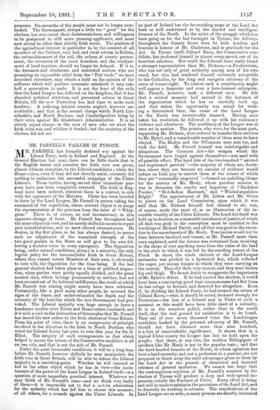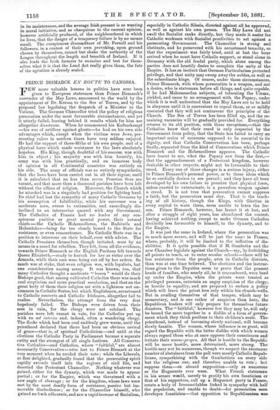MR. PARNELL'S FAILURE IN TYRONE.
MR. PARNELL has formally declared war against the Liberal Party, both in Ireland and England. At the {general Election last year, there can be little doubt that in the English towns and counties the Irish vote was given, almost without exception, to the Liberal candidates ; while the Home-rulers, even if they did not directly assist, certainly did nothing to embarrass the successful campaign of the Ulster Liberals. These tactics, having served their immediate pur- pose, have now been completely reversed. The Irish in Eng- land have been ordered, wherever there is a contest, to side - with the opponents of the Ministry. Ulster has been invaded in force by the Land League, Mr. Parnell in person taking the command of the expedition, whose avowed object is to purge the representation of the province from the taint of " Whig- gistu." There is, of course, no real inconsistency in this apparent change of front. liar. Parnell has throughout had the same objects in view, and he merely shifts his means to repair past miscalculations, and to meet altered circumstances. He desires, in the first place, as he has always desired, to secure , such an adjustment of the numerical strength of the two great parties in the State as will give to his own fol- lowing a decisive voice in every emergency. The Opposition being, under normal conditions, always in a minority, the only logical policy for the irreconcilable Irish in Great Britain, . 'where they cannot return Members of their own, is obviously to vote with the Opposition for the time being. If the last general election had taken place at a time of political stagna- tion, when parties were pretty equally divided, and the great neutral class, which belongs permanently to neither, had not . been aroused out of its habitual indifference, the result at which .Mr. Parnell was aiming might nearly have been achieved. . Fortunately, like a good many other people, he misread the signs of the times, and under-estimated the depth and the intensity of the hostility which the late Government had pro- voked. The Liberal majority was large enough to leave a handsome surplus over Tories and Home-rulers combined, and it is with a view to the destruction of this surplus that Mr. Parnell has issued his new orders to the Irish electors of Great Britain. From his point of view, there is no compromise of principle involved in the direction to the Irish in North Durham who voted for Colonel Joicey last year, to vote this year for Sir G. Elliot. The iniquity of such arrangements as that which helped to secure the return of the Conservative candidate is all on one side, and that is not the side of Mr. Parnell.
. Under the most favourable conditions, it will be a long time before Mr. Parnell, however skilfully he may manipulate the Irish vote in Great Britain, will be able to reduce the Liberal majority to a vanishing-point. Whether he will succeed or fail in the other object which he has in view—the main- tenance of the power of the Land League in Ireland itself—is a question of more immediate practical interest. Whatever we may think of Mr. Parnell's aims—and we think very badly of them—it is impossible not to feel a mit rin admiration for the audacity which has led him to choose this moment, of all others, for a crusade against the Ulster Liberals. In no part of Ireland has the far-reaching scope of the Land Act been so well understood as by the shrewd and intelligent farmers of the North. In the midst of the struggle which has been going on for the last fortnight in Tyrone, the hill-tops throughout the County Down were lit with bonfires and beacons in honour of Mr. Gladstone, and in gratitude for the Act. In Tyrone itself, Colonel Knox, the Conservative can- didate, has professed himself in almost every speech one of its heartiest admirers. Nor could the Liberals have easily found a stronger representative than Mr. Dickson,—a Presbyterian, who was not only of great authority among men of his own creed, but who had rendered himself extremely acceptable to the Catholics, by his long and energetic advocacy of the cause of tenant-right. To contest such a constituency might well appear a desperate and even a hare-brained enterprise.
Mr. Parnell, however, took a different view. He felt that a critical moment had arrived in the fortunes of the organisation which he has so carefully built up, and that unless the opportunity was seized for strik- ing a determined blow, the cause of the Land League in the North was irretrievably doomed. Having once taken his resolution, he followed it up with his customary violence and adroitness. The machinery of the League was at once set in motion. The priests, who were, for the most part, supporting Mr. Dickson, were ordered to transfer their services to Mr. Rylett, and a considerable number of them seem to have obeyed. The Healys and the O'Connors were sent for, and took the field. Mr. Parnell himself was indefatigable and ubiquitous. The Coercion Act—the weapon which the Government have forged against themselves—was used with all possible effect. The hard fate of the two hundred " untried and imprisoned patriots "—the majority of whom are, doubt- less, where they are because no amount of evidence would induce an Irish jury to convict them of the crimes of which they are " reasonably suspected "—formed an unfailing theme for the oratory of Mr. Healy, whose peculiar mission it was to denounce the cruelty and hypocrisy of " Buckshot Forster," " Red-Indian Harcourt," and " Whited-sepulchre Bright." The appointment of Mr. Litton and Mr. Givan to places on the Land Commission, upon which it was said that Mr. Dickson himself had desired to sit, was, of course, made the most of, as an illustration of the in- curable venality of the Ulster Liberals. The Land Act itself was held up to derision, as a miserable instalment of justice, of which all that was good in the conception must be credited to the teachings of Michael Devitt, and all that was good in the execu- tion to the amendments of Mr. Healy. True justice would not bo done between landlord and tenant, as Mr. Parnell more than once explained, until the former was restrained from receiving in the shape of rent anything more than the value of the land in the state in which it was left by the receding waters of the Flood. In short, the whole rhetoric of the Land-League emissaries was pitched in a hysterical key, which reflected the eager, yet uneasy temper in which they were carrying on the contest. They did their very utmost, and they were beaten hip and thigh. We do not desire to exaggerate the importance of Mr. Rylett's defeat. If he had carried the election, it would have been a convincing proof that common-sense had fled from its last refuge in Ireland, and deserted her altogether. Even if, by dividing the Liberal Party, he had secured the return of Colonel Knox,—who, it should be noted, declared strongly for Protection—the loss of a Liberal seat in Ulster at such a. moment as this would have been little short of a calamity. It is in the numbers polled, rather than in the result itself, that the real ground for satisfaction is to be found. That out of over seven thousand votes the Land-league candidate, backed by the personal advocacy of Mr. Parnell, should not have obtained more than nine hundred, is a fact of unmistakable significance. It shows that in a typical Ulster county the League has lost its hold upon the people ; that there, at any rate, the reckless Billingsgate of speakers like Mr. Healy is not to the popular taste ; and that the hard-headed farmers of the North, to whom agitation has been a hard necessity, and not a profession or a pastime, are not prepared to throw away the solid advantages given to them by the Land Act in the pursuit of chimerical and immoral schemes of general spoliation. We cannot but hope that the contemptuous rejection of Mr. Parnell's nominee by the electors of Tyrone will produce a deep and wide-spread im- pression outside the Province of Ulster. Every effort is being and will be made to minimise the provisions of the Land Act, and to discredit its working in advance. The ramifications of the Land League are so wide, so many persons are directly interested in its maintenance, and the average Irish peasant is so wanting in moral initiative, and so obsequious to the current opinion, however artificially produced, of the neighbourhood in which he lives, that the danger of a temporary failure is by no means small. The conspicuous discomfiture of Mr. Parnell and his followers, in a contest of their own provoking, upon ground chosen by themselves, cannot but shake the authority of the League throughout the length and breadth of Ireland. If it also leads the Irish farmers to examine and test for them- selves what it is that the Land Act really gives them, the fate of the agitation is already sealed.































 Previous page
Previous page